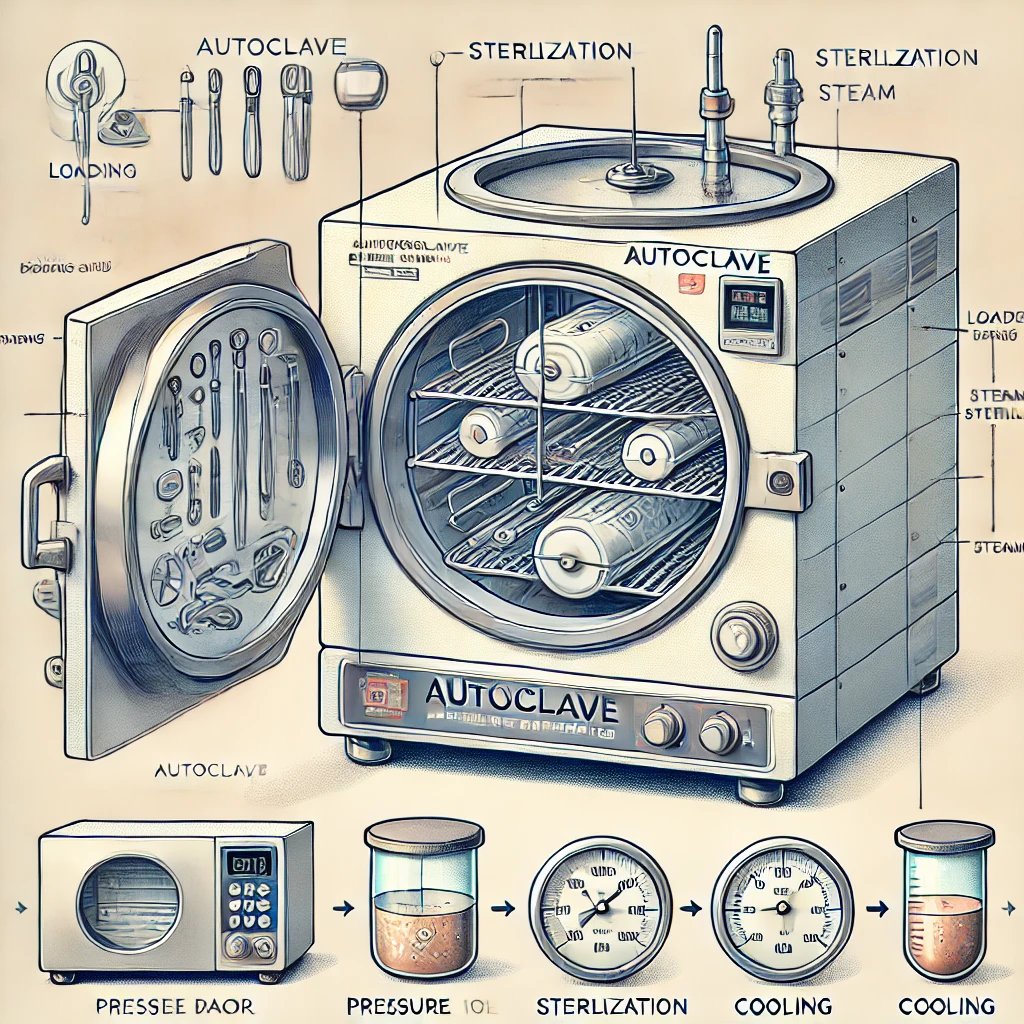A Comprehensive Guide to Autoclave Medical and Lab Devices for Decision Makers, Medics, and Researchers
Sterilization is a critical process in medical and laboratory settings, ensuring the safety of equipment, instruments, and biological materials. The autoclave is one of the most effective sterilization devices, using high-pressure steam to eliminate bacteria, viruses, fungi, and spores. This guide provides decision-makers, medical professionals, and researchers with essential insights into autoclave capacity, precision, leading brands, alternative solutions, pricing, and future advancements.
Medtechsolns
3/22/20252 min read


Understanding the Autoclave
An autoclave is a steam-based sterilization device that operates at high temperatures and pressures to disinfect and sterilize materials. It is widely used in:
✅ Hospitals & Clinics: Sterilizing surgical instruments, medical devices, and waste disposal.
✅ Laboratories: Ensuring contamination-free tools and research environments.
✅ Pharmaceutical & Biotech Industries: Sterilizing media, glassware, and production equipment.
✅ Tattoo Studios & Dental Clinics: Maintaining hygiene standards for reusable tools.
Capacity and Precision of Autoclaves
Autoclave performance is determined by capacity, cycle time, and sterilization accuracy.
🔹 Capacity: Ranges from small benchtop models (5-20 liters) for clinics to large industrial autoclaves (200+ liters) for hospitals and research labs.
🔹 Precision: Modern autoclaves feature programmable temperature and pressure controls, ensuring sterilization consistency for different materials.
🔹 Cycle Time: Varies based on load type and size, typically 15-60 minutes per cycle.
🔹 Validation & Monitoring: Many models come with digital sensors, cycle tracking, and validation reports to comply with medical and laboratory regulations.
Leading Brands and Manufacturers
Several global manufacturers produce high-quality autoclaves tailored for various applications.
🏥 Top Autoclave Manufacturers:
Tuttnauer – Reliable models for medical, dental, and laboratory use.
Midmark – Known for compact autoclaves for clinics and dental offices.
Getinge – Offers large-scale hospital and research autoclaves.
Steris – High-performance autoclaves for pharmaceutical and biotech industries.
Belimed – Specializes in healthcare and life sciences sterilization.
Priorclave – Known for robust laboratory autoclaves.
Astell Scientific – Offers customizable autoclaves for research applications.
Each brand provides models with varying capacities, sterilization cycles, and automation features to meet specific healthcare, research, and industrial needs.
Alternative Solutions and Interventions
If an autoclave is unavailable or inaccessible, alternative sterilization methods include:
✅ Chemical Sterilization: Using ethylene oxide (EtO), hydrogen peroxide plasma, or peracetic acid for heat-sensitive instruments.
✅ Dry Heat Sterilization: Suitable for glassware and metal tools, though requiring higher temperatures and longer cycles.
✅ UV Sterilization: Effective for surface disinfection, but not a substitute for deep sterilization.
✅ Gamma & Electron Beam Sterilization: Used in industrial settings for large-scale sterilization of medical devices.
✅ Boiling & Disinfectants: While not as effective as autoclaves, boiling water or chemical disinfectants can provide temporary solutions for non-critical instruments.
Price Guide: Investment Considerations
Autoclave prices vary based on size, features, and automation level.
💰 Small Benchtop Autoclaves (5-20L): $2,000 - $10,000
💰 Mid-Size Autoclaves (20-100L): $10,000 - $50,000
💰 Large Industrial Autoclaves (100L+): $50,000 - $200,000+
Additional costs include installation, maintenance, consumables, and compliance validation. Leasing and refurbished units offer budget-friendly alternatives.
The Future of Autoclave Technology
The future of autoclaves is evolving with advancements in automation, sustainability, and integration.
🔮 Key Future Trends:
Smart Autoclaves: AI-driven monitoring systems will enhance efficiency and cycle optimization.
Eco-Friendly Sterilization: Energy-efficient autoclaves with water-saving technologies.
Portable & Compact Models: Innovations for mobile clinics and field laboratories.
Integration with Digital Health Systems: Autoclaves will feature cloud-based tracking and remote monitoring for compliance and efficiency.
Hybrid Sterilization Technologies: Combining plasma and steam for improved sterilization of complex instruments.
Final Thoughts
Autoclaves are indispensable for medical, laboratory, and industrial sterilization. Whether selecting an autoclave for a small clinic, large hospital, or research facility, considering capacity, precision, and automation is crucial.
✅ Key Takeaways:
Choose the right size and features based on your facility's sterilization needs.
Explore top brands like Tuttnauer, Getinge, and Steris for high-quality options.
Consider alternatives like chemical or dry heat sterilization if autoclaves are unavailable.
Future trends in automation and sustainability will enhance efficiency and compliance.
🗣 Are you planning to invest in an autoclave? What factors influence your decision? Let us know in the comments!
